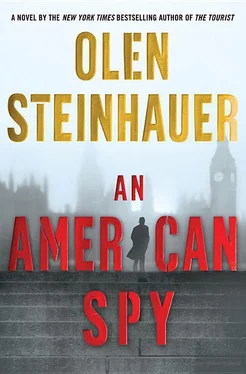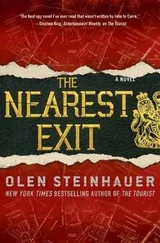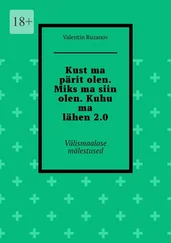Olen Steinhauer - An American spy
Здесь есть возможность читать онлайн «Olen Steinhauer - An American spy» весь текст электронной книги совершенно бесплатно (целиком полную версию без сокращений). В некоторых случаях можно слушать аудио, скачать через торрент в формате fb2 и присутствует краткое содержание. Жанр: Шпионский детектив, на английском языке. Описание произведения, (предисловие) а так же отзывы посетителей доступны на портале библиотеки ЛибКат.
- Название:An American spy
- Автор:
- Жанр:
- Год:неизвестен
- ISBN:нет данных
- Рейтинг книги:3 / 5. Голосов: 1
-
Избранное:Добавить в избранное
- Отзывы:
-
Ваша оценка:
- 60
- 1
- 2
- 3
- 4
- 5
An American spy: краткое содержание, описание и аннотация
Предлагаем к чтению аннотацию, описание, краткое содержание или предисловие (зависит от того, что написал сам автор книги «An American spy»). Если вы не нашли необходимую информацию о книге — напишите в комментариях, мы постараемся отыскать её.
An American spy — читать онлайн бесплатно полную книгу (весь текст) целиком
Ниже представлен текст книги, разбитый по страницам. Система сохранения места последней прочитанной страницы, позволяет с удобством читать онлайн бесплатно книгу «An American spy», без необходимости каждый раз заново искать на чём Вы остановились. Поставьте закладку, и сможете в любой момент перейти на страницу, на которой закончили чтение.
Интервал:
Закладка:
It had been a long speech, but Zhang Guo didn’t need to spend much time digesting it; he’d heard much of this before. He sipped his beer from the bottle, emptied it, then set the bottle down. He said, “You’ve already lost this argument, Xin Zhu. Twelve years ago Jia Chunwang gave you a public throttling because you were trying to stop him from recalling our undercover agents in the West. You barely survived that. This year, you alienated the entire Ministry of Public Security with your unfounded mole theory. Now you’re ignoring anyone who might oppose you. You’re pretending they don’t even exist. But they do exist, Xin Zhu. And they’ll eat you alive.”
Zhu sighed, reaching for his own bottle. “Did you know that, ever since he took the job, the director of the CIA itself had been lobbying to get rid of the Department of Tourism? They have as many backroom battles as we do. Quentin Ascot may be embarrassed by what I’ve done, but in the end he won’t fight back because I’ve done what he’s been unable to do.”
“I doubt he wanted to actually kill the whole department.”
“I saved him a lot of retirement packages.”
“And now there’s a Tourist poking around Beijing. Think that maybe your calculations were off?”
“How about these calculations, Zhang Guo? Imagine that I’m right about the mole in the Ministry of Public Security, and he reports to the CIA on Monday that Xin Zhu has been sacked. They learn that the only person willing to make them pay for what they did to us in Sudan was fired. Are you with me? Now run the math. How long before they try something like that again?”
Zhang Guo took out a cigarette. “Maybe, knowing you’re not around to shoot them in the face, they’ll try to make friends.”
Zhu considered this, staring down at the remains of his fried eel. It didn’t look like Wu Liang at all. “If someone is looking at me, it’s not Quentin Ascot. I’m convinced of that.”
“Then who is it?”
Zhu rubbed his face and reached for a fresh beer.
3
The only similarity between the fried eel and Wu Liang was the indigestion that struck him on the long train ride from Jinan down to Shanghai, making it hard to doze even in the deluxe soft sleeper cabin, with its private toilet and a view of the countryside blackness between stations. Nanjing was lit up like a landing field, even though the sun had risen by then, and it was afternoon by the time he reached Shanghai. Wobbly with fatigue, he stored his bag in a station locker, then took buses over to Fucheng Road and searched until he’d found, among the looming modern towers, a public phone booth. He called the Shangri-La and, putting on a slightly comical Hokkien accent, asked to speak to Mr. Xin Zhu. Two rings, then he hung up and called again, telling the clerk that he’d been disconnected. This time, it only rang once before a man said in a tired voice not unlike Xin Zhu’s, “Wei?”
“Mr. Xin Zhu,” Zhu said, keeping up the accent, “you called us regarding a date for this evening. We’re sorry that your usual friend is not available, but perhaps we can send someone else.”
“That may be acceptable,” said the hotel guest, who was in fact He Qiang, a field agent he had twice before used to impersonate himself. It was a rare man who had the build to impersonate Xin Zhu, though He Qiang still required ample padding.
Zhu stifled a yawn. “She will need to know your room number, of course.”
“Of course, it’s 1298. But maybe, to start, she and I could have a drink in the hotel bar.”
“An excellent idea,” said Zhu. “Might I suggest an eight o’clock rendezvous in the Jade on 36?”
Zhu gave it another half hour, strolling down to the dock and finding, to his delight, a Haagen-Dazs shop, where he bought a scoop of Chocolate Chocolate Chip that he ate while sitting on a bench and gazing at the Huangpu River. He watched faces again, but these were a more developed version of the New Chinese he had seen on the train to Qingdao. The high-rises of Qingdao had their share of business elite, but Shanghai was their breeding ground. They sported suits like second skins, the women comfortable in Western fashions, all secure in the knowledge that their city, the most populous city of the most populous country on the planet, had a reach that stretched around the globe. He hadn’t been lying when he told Zhang Guo that China was the superpower to be reckoned with, and though he could never feel comfortable with the economic policies that Shanghai represented, its very existence proved that their country was now something completely different. Arriving here was like arriving at a future of perpetual motion, and it was part of his responsibility to make sure that nothing external slowed it down. Perpetual motion, perpetual revolution. He ate his ice cream slowly, feeling it cut through the eel that seemed to still slither in his stomach, and thought of speed.
He entered as any guest would, through the glassy front doors and into the packed marble lobby, knowing that whoever was watching-and whether they’d been sent by Wu Liang, the committee, or the Americans, someone was always watching-would think that he’d eluded them on the way out, and that was something no watcher would admit in a report. He breezed past a gathering of Japanese businessmen and shared the elevator with a Canadian couple who were plainly in love. A rare sight.
The door to 1298, though displaying a DO NOT DISTURB sign, was ajar. He pushed it open to find a clean, empty room, the blinds drawn, and a key card left on the foot of the made bed. He closed the door behind himself, heard noise in the bathroom, and found He Qiang, a thick, big-shouldered man in his forties with a small mole on his cheek, sitting on the toilet, smiling. Hanging from the curtain rod, dripping dry, was a padded undergarment-the “fat suit” He Qiang had arrived wearing.
They shook hands, and Zhu leaned close to his ear, whispering, “I’m going to sleep. Wake me at seven.”
He Qiang nodded.
“She’ll make it by eight?”
“You’ll like her,” He Qiang whispered. “Xinyang girl. Very nice, and she knows the town. If you like, she can show you a good time.”
Zhu gave him a look, and He Qiang raised his hands.
“If you like, I said.”
Zhu washed up, and by the time he lay on the large, hard bed it was just after two. He Qiang plugged headphones into the television, settled on the floor, and began watching a DVD that, Zhu realized before falling asleep, was from Bollywood. So He Qiang liked the music and melodrama of those sorts of movies. He’d never have suspected the man was a dreamer. Xin Zhu certainly was not, and his dreamless sleep proved it.
He Qiang woke him gently with a shake of the shoulder, then pointed at a cup of hot black tea on the bedside table, alongside a sheet of paper filled with childlike scrawl. As he sipped the tea, he read over what proved to be He Qiang’s report of his time in the hotel. Who he’d spotted down in the street, how many calls (unanswered, of course) came to his room, and when, and the demeanor of the service staff that visited the room. Upon arriving, he’d changed his room but still found one camera in the overhead lamp, which he’d disposed of, and two microphones-he’d left one of them. No one had tried to replace anything. He Qiang’s assessment, which tallied with Xin Zhu’s, was that while there was no urgency to the surveillance, someone was certainly keeping tabs on him.
Zhu was able to verify this when he descended in the elevator, wearing one of the suits He Qiang had packed, and found, leaning against a wall outside the Jade, an athletic-looking young man working his way through a copy of People’s Daily. He was dressed like a factory worker ready for a big night out-a peasant’s idea of what the urban rich wear to gala events-but none of the hotel staff was kicking him out. Zhu passed him without a glance and found a place at the end of the Jade’s glowing bar.
Читать дальшеИнтервал:
Закладка:
Похожие книги на «An American spy»
Представляем Вашему вниманию похожие книги на «An American spy» списком для выбора. Мы отобрали схожую по названию и смыслу литературу в надежде предоставить читателям больше вариантов отыскать новые, интересные, ещё непрочитанные произведения.
Обсуждение, отзывы о книге «An American spy» и просто собственные мнения читателей. Оставьте ваши комментарии, напишите, что Вы думаете о произведении, его смысле или главных героях. Укажите что конкретно понравилось, а что нет, и почему Вы так считаете.












